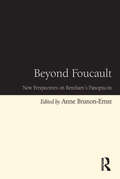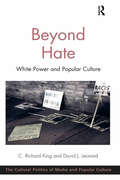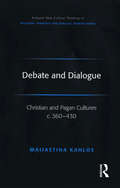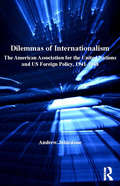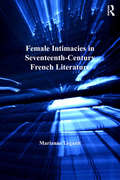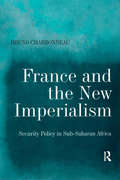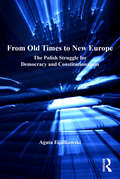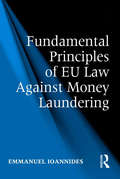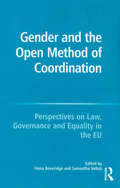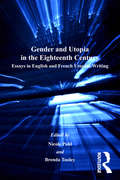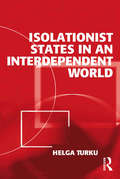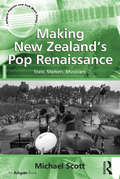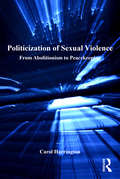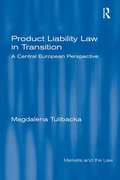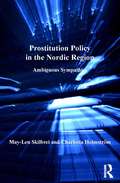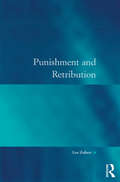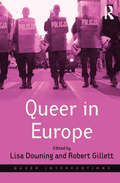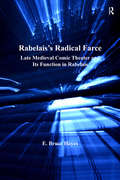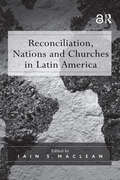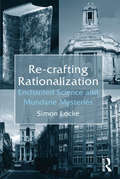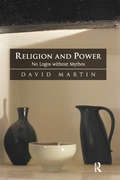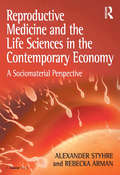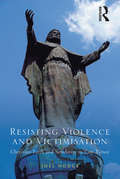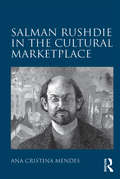Special Collections
Benetech’s Global Certified Accessible Titles
Description: Benetech’s GCA program is the first independent third-party EPUB certification to verify ebook accessibility. By creating content that is born accessible, publishers can meet the needs of all readers. Learn more: https://bornaccessible.benetech.org/
- Table View
- List View
Beyond Foucault
by Anne Brunon-ErnstIn his hugely influential book Discipline and Punish, Foucault used the example of Jeremy Bentham's Panopticon prison as a means of representing the transition from the early modern monarchy to the late modern capitalist state. In the former, power is visibly exerted, for instance by the destruction of the body of the criminal, while in the latter power becomes invisible and focuses on the mind of the subject, in order to identify, marginalize, and 'treat' those who are regarded as incapable of participating in, or unwilling to submit to, the disciplines of production. The Panopticon links the worlds of Bentham and Foucault scholars yet they are often at cross-purposes; with Bentham scholars lamenting the ways in which Foucault is perceived to have misunderstood panopticon, and Foucauldians apparently unaware of the complexities of Bentham's thought. This book combines an appreciation of Bentham's broader project with an engagement of Foucault's insights on economic government to go beyond the received reading of panopticism as a dark disciplinary technology of power. Scholars here offer new ways of understanding the Panopticon projects through a wide variety of topics including Bentham's plural Panopticons and their elaboration of schemes of 'panoptic Utopia', the 'inverted Panopticon', 'panoptic governance', 'political panopticism' and 'legal panopticism'. French studies on the Panopticon are groundbreaking and this book brings this research to an English-speaking audience for the first time. It is essential reading, not only for those studying Bentham and Foucault, but also those with an interest in intellectual history of the eighteenth and nineteenth centuries, and those studying contemporary surveillance and society.
Beyond Hate
by C. Richard King and David J. LeonardBeyond Hate offers a critical ethnography of the virtual communities established and discursive networks activated through the online engagements of white separatists, white nationalists, and white supremacists with various popular cultural texts, including movies, music, television, sport, video games, and kitsch. Outlining the ways in which advocates of white power interpret popular cultural forms, and probing the emergent spaces of white power popular culture, it examines the paradoxical relationship that advocates of white supremacy have with popular culture, as they finding it to be an irresistible and repugnant reflection of social decay rooted in multiculturalism. Drawing on a range of new media sources, including websites, chat rooms, blogs and forums, this book explores the concerns expressed by advocates of white power, with regard to racial hierarchy and social order, the crisis of traditional American values, the perpetuation of liberal, feminist, elitist ideas, the degradation of the family and the fetishization of black men. What emerges is an understanding of the instruments of power in white supremacist discourses, in which a series of connections are drawn between popular culture, multiculturalism, sexual politics and state functions, all of which are seen to be working against white men. A richly illustrated study of the intersections of white power and popular culture in the contemporary U.S., and the use of use cyberspace by white supremacists as an imagined site of resistance, Beyond Hate will appeal to scholars of sociology and cultural studies with interests in race and ethnicity, popular culture and the discourses of the extreme right.
Debate and Dialogue
by Maijastina KahlosThis book explores the construction of Christian identity in fourth and fifth centuries through inventing, fabricating and sharpening binary oppositions. Such oppositions, for example Christians - pagans; truth - falsehood; the one true god - the multitude of demons; the right religion - superstition, served to create and reinforce the Christian self-identity. The author examines how the Christian argumentation against pagans was intertwined with self-perception and self-affirmation. Discussing the relations and interaction between pagan and Christian cultures, this book aims at widening historical understanding of the cultural conflicts and the otherness in world history, thus contributing to the ongoing discussion about the historical and conceptual basis of cultural tolerance and intolerance. This book offers a valuable contribution to contemporary scholarly debate about Late Antique religious history and the relationship between Christianity and other religions.
Dilemmas of Internationalism
by Andrew JohnstoneDilemmas of Internationalism is a new political history of the 1940s which charts and analyses the efforts of private internationalists to define US internationalism and promote the establishment of the United Nations. Internationalists hoped that the United States would shake off the fear of entangling alliances that had characterised the nation's history, replacing isolationism and unilateralism with a new, involved and multilateral approach to foreign affairs. During and after World War II, a number of private individuals and organisations were at the forefront of the fight to change the nature of US foreign policy. This book focuses in particular on the most important internationalist organisation: the American Association for the United Nations (AAUN), known as the League of Nations Association through 1944. It situates the AAUN in the vast network of private organisations promoting an internationalist foreign policy during and after World War II, and analyses the connections between the AAUN and the US government and key public figures who proposed a more internationalist foreign policy. One of the most innovative aspects of Dilemmas of Internationalism is its focus on state-private interaction with regard to defining internationalism. Most previous works on wartime internationalism neglect considerations of state-private interaction, or fail to significantly develop them. The study also acts as a corrective to the general neglect of state-private interaction during this period, turning attention away from the common focus on the Cold War to the crucial phase during and immediately after World War II. Beginning with the US entry into the War, this study continues through the onset of the Cold War to early 1948, ending with the passing of the Marshall Plan. By 1948, the path of US internationalism appeared firmly fixed by a Cold War framework, but in 1941, US entry into the Second World War offered the opportunity to develop a more multilateral approach to foreign affairs, and create a more just and peaceful world. This book is a much-needed history of the attempt to seize that opportunity.
Female Intimacies in Seventeenth-Century French Literature
by Marianne LegaultExamining literary discourses on female friendship and intimacy in seventeenth-century France, this study takes as its premise the view that, unlike men, women have been denied for centuries the possibility of same sex friendship. The author explores the effect of this homosocial and homopriviledged heritage on the deployment and constructions of female friendship and homoerotic relationships as thematic narratives in works by male and female writers in seventeenth-century France. The book consists of three parts: the first surveys the history of male thinkers' denial of female friendship, concluding with a synopsis of the cultural representations of female same-sex practices. The second analyzes female intimacy and homoerotism as imagined, appropriated and finally repudiated by Honoré d'Urfé's pastoral novel, L'Astrée, and Isaac de Benserade's seemingly lesbian-friendly comedy, Iphis et Iante. The third turns to unprecedented depictions of female intimate and homoerotic bonds in Madeleine de Scudéry's novel Mathilde and Charlotte-Rose de Caumont de La Force's fairy tale Plus Belle que Fée. This study reveals a female literary genealogy of intimacies between women in seventeenth-century France, and adds to the research in lesbian and queer studies, fields in which pre-eighteenth-century French literary texts are rare.
France and the New Imperialism
by Bruno CharbonneauThe role of French security policy and cooperation in Africa has long been recognized as a critically important factor in African politics and international relations. The newest form of security cooperation, a trend which merges security and development and which is actively promoted by other major Western powers, adds to our understanding of this broader trend in African relations with the industrialized North. This book investigates whether French involvement in Africa is really in the interest of Africans, or whether French intervention continues to deny African political freedom and to sustain their current social, economic and political conditions. It illustrates how policies portrayed as promoting stability and development can in fact be factors of instability and reproductive mechanisms of systems of dependency, domination and subordination. Providing complex ideas in a clear and pointed manner, France and the New Imperialism is a sophisticated understanding of critical security studies.
From Old Times to New Europe
by Agata FijalkowskiFrom Old Times to New Europe considers the post-totalitarian legal framework in today's Europe, arguing that the study of totalitarianism and post-totalitarianism continues to be significant as ever. Drawing mainly on the Polish experience, this analysis focuses on the significant part played by history in the development of the region's identity and preferences concerning the role of the state in public and private life. It examines the political, socio-economic and legal aspects of key events and draws comparisons with other CEE states, whilst implementing key socio-legal theories to explain trends and strains in this post-Communist and post-totalitarian period. With the benefit of access to archival sources in Poland and Russia, this book will be of interest to students and researchers of European law, law and society and international criminal justice.
Fundamental Principles of EU Law Against Money Laundering
by Emmanuel IoannidesThis book critically analyses fundamental principles of EU law for the control of international economic crime. Discussing how the reporting system and the exchange of information are at the heart of the global anti-money laundering regime, the study also looks at the inferential force of financial intelligence in criminal proceedings and the responsibilities this places on prosecutors and criminals alike. The author closely examines the application of Article 8(2) of the European Court of Human Rights for the retention and movement of the fingerprints, cellular samples and DNA profiles of unconvicted persons, and argues the incompatibility with the ECHR, along with the effect of socially stigmatising unconvicted persons. The work concludes with exploring how financial regulation has, inter alia, shifted responsibility to businesses and financial institutions to become more transparent and accountable to financial regulators and tax authorities. This critical analysis is essential reading for law students and the Judicial Body, as well as financial crime investigators and regulators.
Gender and the Open Method of Coordination
by Samantha VellutiContaining contributions by some of the best known researchers in the field, this volume considers the intersection between the Open Method of Coordination (OMC), a relatively new mode of policy-making, and gender equality, a long-standing area of EU policy. It draws on a range of disciplinary perspectives to examine the effectiveness of the OMC as a medium for the advancement of gender equality within the EU. It also considers gender in the OMC in a variety of contexts and at both a general EU and Member State level. Central to the discussion is the concept of gender mainstreaming which proposes that a gender equality perspective should be incorporated at every level and opportunity of EU policy and practice. The authors assess how successful this has been in the context of the OMC. The book provides a unique and contemporary body of work on the OMC which adds significantly to existing understandings of this form of governance and informs critical debate of EU social governance.
Gender and Utopia in the Eighteenth Century
by Brenda TooleyFocusing on eighteenth-century constructions of symbolic femininity and eighteenth-century women's writing in relation to contemporary utopian discourse, this volume adjusts our understanding of the utopia of the Enlightenment, placing a unique emphasis on colonial utopias. These essays reflect on issues related to specific configurations of utopias and utopianism by considering in detail English and French texts by both women (Sarah Scott, Sarah Fielding, Isabelle de Charrière) and men (Paltock and Montesquieu). The contributors ask the following questions: In the influential discourses of eighteenth-century utopian writing, is there a place for 'woman,' and if so, what (or where) is it? How do 'women' disrupt, confirm, or ground the utopian projects within which these constructs occur? By posing questions about the inscription of gender in the context of eighteenth-century utopian writing, the contributors shed new light on the eighteenth-century legacies that continue to shape contemporary views of social and political progress.
Isolationist States in an Interdependent World
by Helga TurkuStates that withdraw from the international system provide insight into an unexplored area of international relations in terms of rationality, self-interest, power politics, cooperation and alliances. Indeed, isolationism in an interdependent state system goes against the logic of modern society and state systems. Using historical, comparative and inductive analysis, Helga Turku explains why states may choose to isolate themselves both domestically and internationally, using comparative historical analysis to flesh out isolationism as a concept and in practice. The book examines extreme forms of self-imposed domestic and international isolation in an interdependent international system, noting the effects on both the immediate interests of a ruling regime and the long-term national interests of the state and the populace.
Making New Zealand's Pop Renaissance
by Michael ScottSince the early 2000s New Zealand has undergone a pop renaissance. Domestic artists' sales, airplay and concert attendance have all grown dramatically while new avenues for 'kiwi' pop exports emerged. Concurrent with these trends was a new collective sentiment that embraced and celebrated domestic musicians. In Making New Zealand's Pop Renaissance, Michael Scott argues that this revival arose from state policies and shows how the state built market opportunities for popular musicians through public-private partnerships and organizational affinity with existing music industry institutions. New Zealand offers an instructive case for the ways in which 'after neo-liberal' states steer and co-ordinate popular culture into market exchange by incentivizing cultural production. Scott highlights how these music policies were intended to address various economic and social problems. Arriving with the creative industries' discourse and policy making, politicians claimed these expanded popular music supports would facilitate sustainable employment and a sense of national identity. Yet popular music as economic and social policy presents a paradox: the music industry generates commercial failure and thus requires a large unattached pool of potential talent. Considering this feature, Scott analyses how state programs induced an informal economy of proto-pop production aimed at accessing competitive state funding while simultaneously encouraging musicians to adopt entrepreneurial subjectivities. In doing so he argues New Zealand's music policies are a form of social policy that unintentionally deploy hierarchical structures to foster social inclusion amongst growing numbers of creative workers.
Milton's Ovidian Eve
by Mandy GreenMilton's Ovidian Eve presents a fresh and thorough exploration of the classical allusions central to understanding Paradise Lost and to understanding Eve, one of Milton's most complex characters. Mandy Green demonstrates how Milton appropriates narrative structures, verbal echoes, and literary strategies from the Metamorphoses to create a subtle and evolving portrait of Eve. Each chapter examines a different aspect of Eve's mythological figurations. Green traces Eve's development through multiple critical lenses, influenced by theological, ecocritical, and feminist readings. Her analysis is gracefully situated between existing Milton scholarship and close textual readings, and is supported by learned references to seventeenth-century writing about women, the allegorical tradition of Ovidian commentary, hexameral literature, theological contexts and biblical iconography. This detailed scholarly treatment of Eve simultaneously illuminates our understanding of the character, establishes Milton's reading of Ovid as central to his poetic success, and provides a candid synthesis and reconciliation of earlier interpretations.
Politicization of Sexual Violence
by Carol HarringtonIn the 1990s, feminist scholars on the politics of rape experienced a sudden surge of interest in their, until then, marginal field. Why was the 1990s the right time for rape to become an international security problem? Furthermore, why suddenly in the 1990s did rape become problematized as an international issue not just by the feminist fringes of protest movements but also by intergovernmental bureaucracies? To explore these questions, Carol Harrington traces the historical change in the politicization of rape as an international problem and explains how early international women's organizations gained expert authority on rape by drawing on abolitionist rhetoric of bodily integrity. She discusses why they abandoned their politicization of rape in the inter-war period and why rape only reappeared as an international security question requiring gender expertise on trauma after the Cold War.
Product Liability Law in Transition
by Magdalena TulibackaThis volume examines the evolution of Central European product liability systems, with particular reference to the effect of the implementation of the Product Liability Directive in the context of the recent enlargement of the EU. This book also provides a comparison of how product liability law has evolved in the socialist states, comparing it to developments taking place in the West. Using product liability law, this study offers a valuable insight into the necessary features and requirements of the harmonization of laws between the EU and post-socialist Europe. Predominantly legal in scope, it also takes account of the importance of extra-legal elements in law reform. As such, this book will be a valuable resource for those interested in European Law, as well as those working in the area of Consumer and Product Liability law.
Prostitution Policy in the Nordic Region
by May-Len Skilbrei and Charlotta HolmströmThere is great interest internationally in the development of prostitution policies in the Nordic countries after Sweden, Norway and Iceland have introduced general bans against buying sex whilst selling sex remains legal. In addition, there is a partial ban against buying sex in Finland. This is a different approach from that of several other European countries, where we have seen a decriminalisation of third-party involvement in prostitution as well as to that of the USA which criminalises both the buying and selling of sexual services. Thus the Nordic countries are often treated as representatives of a 'Nordic model' of prostitution policies. In this book - the first on the subject - Skilbrei and Holmström argue that these models of policies or policy regimes tend to ignore the trajectories, contexts and consequences of the full range of approaches to prostitution, thus they are too simplistic and static. Prostitution policies in the Nordic countries are multifaceted and dynamic, and cannot be represented as following a straight path and detached from empirical contexts. Their analysis treats Nordic prostitution policies both as a product of history, of current national and Nordic debates, and of international obligations and changes in the international and national prostitution markets. Furthermore they argue that a broad understanding of the relevant context is necessary so as to place Nordic prostitution policies within broader policy concerns related to gender, class, ethnicity, sexuality, social welfare, immigration and organised crime, as well as to neoliberal forms of governance.
Punishment and Retribution
by Leo ZaibertDiscussions of punishment typically assume that punishment is criminal punishment carried out by the State. Punishment is, however, a richer phenomenon and it occurs in many contexts. This book contains a general account of punishment which overcomes the difficulties of competing accounts. Recognizing punishment's manifoldness is valuable not merely in contributing to conceptual clarity, but in that this recognition sheds light on the complicated problem of punishment's justification. Insofar as they narrowly presuppose that punishment is criminal punishment, most apparent solutions to the tension between consequentialism and retributivism are rather unenlightening if we attempt to apply them in other contexts. Moreover, this presupposition has given rise to an unwieldy variety of accounts of retributivism which are less helpful in contexts other than criminal punishment. Treating punishment comprehensibly helps us to better understand how it differs from similar phenomena, and to carry on the discussion of its justification fruitfully.
Queer in Europe
by Robert GillettQueer in Europe takes stock of the intellectual and social status and treatment of queer in the New Europe of the twenty-first century, addressing the ways in which the Anglo-American term and concept 'queer' is adapted in different national contexts, where it takes on subtly different overtones, determined by local political specificities and intellectual traditions. Bringing together contributions by carefully chosen experts, this book explores key aspects of queer in a range of European national contexts, namely: Belgium, Cyprus, England, France, Germany, Hungary, Ireland, Italy, The Nordic Region, The Netherlands, Poland, Russia and Spain. Rather than prescribing a universalizing definition, the book engages with a wide spectrum of what is meant by 'queer', as each chapter negotiates the contested border between direct queer activist action based on identity categories, and more plural queer strategies that call these categories into question. The first volume in English devoted to the exploration of queer in Europe, this book makes an important intervention in contemporary queer studies.
Rabelais's Radical Farce
by E. Bruce HayesIn the first extended investigation of the importance of dramatic farce in Rabelais studies, Bruce Hayes makes an important contribution to the understanding of the theater of farce and its literary possibilities. By tracing the development of farce in late medieval and Renaissance comedic theater in comparison to the evolution of farce in Rabelais's work, Hayes distinguishes Rabelais's use of the device from traditional farce. While traditional farce is primarily conservative in its aims, with an emphasis on maintaining the status quo, Rabelais puts farce to radical new uses, making it subversive in his own work. Bruce Hayes examines the use of farce in Pantagruel, Gargantua, and the Tiers and Quart livres, showing how Rabelais recast farce in a humanist context, making it a vehicle for attacking the status quo and posing alternatives to contemporary legal, educational, and theological systems. Rabelais's Radical Farce illustrates the rich possibilities of a genre often considered simplistic and unsophisticated, disclosing how Rabelais in fact introduced both a radical reformulation of farce, and a new form of humanist satire.
Reconciliation, Nations and Churches in Latin America
by Iain S. MacleanThis book examines the recent phenomenon in Latin America of national Truth and Reconciliation commissions. Few studies have examined the role of Churches or religion in political processes that proclaim valued theological terms as their agenda - truth, forgiveness, and reconciliation. This book questions the role of religion, specifically of established Churches. The impact of such reconciliation commissions on Indigenous Native Americans is also examined, as is the role of women and how both commissions and Churches or religions were challenged by their experiences. The contributors offer differing perspectives on one or more national truth and reconciliation processes and thus offer a collection that serves as valuable source for the disciplines of Religious Studies, Ethics, Theology, Political Science, Social Sciences and Women's Studies.
Re-crafting Rationalization
by Simon LockeRe-crafting Rationalization contributes to debates relating to the public understanding of science, regarding the conceptualization of the relationship between 'science' and 'the public'. It challenges the prevailing science-centred or 'top-down' framework that currently informs notions of 'public engagement' and 'knowledge-transfer', offering an alternative that remains firmly grounded in the discourse of classical social theory. By proposing an alternative version of rationalization to the standard interpretation of Weber's disenchantment thesis, this book establishes the public understanding of science as a matter of fundamental sociological concern. As such, it redefines this field to emphasize public meanings of science, engaging with a range of topics of major interest to the public and popular meaning of science, including science and religion, science fiction and fantasy, 'fringe' science and media representations of science. Combining rhetorical analysis with ethnomethodology and membership categorization analysis, the book outlines the basis of a new approach to the sociology of knowledge, in the light of which Weber's rationalization thesis is radically re-crafted in relation to studies of scientists' discourse, the rhetoric of science popularization and public usages of science. This re-crafted rationalization is applied in a series of detailed empirical studies of enchanted science (creationism and intelligent design, Scientology and reflexive spirituality, superhero comics) and mundane mysteries (Fortean discourse, conspiracy theory and media representations of 'the scientist' in the case of Jack the Ripper). Re-crafting Rationalization therefore redresses a significant shortcoming in contemporary social theory, which currently overlooks or misrepresents important public meanings of science, whilst excluding popular culture from attention. With profound implications for the ways in which we make sense of developments involving science, this book will be of interest not only to sociologists and social theorists, but also to those interested in popular culture and subcultures and the history, philosophy and sociology of science.
Religion and Power
by David MartinThere are few more contentious issues than the relation of faith to power or the suggestion that religion is irrational compared with politics and peculiarly prone to violence. The former claim is associated with Juergen Habermas and the latter with Richard Dawkins. In this book David Martin argues, against Habermas, that religion and politics share a common mythic basis and that it is misleading to contrast the rationality of politics with the irrationality of religion. In contrast to Richard Dawkins (and New Atheists generally), Martin argues that the approach taken is brazenly unscientific and that the proclivity to violence is a shared feature of religion, nationalism and political ideology alike rooted in the demands of power and social solidarity. The book concludes by considering the changing ecology of faith and power at both centre and periphery in monuments, places and spaces.
Reproductive Medicine and the Life Sciences in the Contemporary Economy
by Alexander StyhreIn Reproductive Medicine and the Life Sciences in the Contemporary Economy, Alexander Styhre and Rebecka Arman illuminate issues that have given rise to terms such as 'the bioeconomy' and 'the baby business'. The life sciences play an increasing role in providing services and commodities consumed by businesses and the public. Based on an in-depth study of clinics offering assisted fertilization in Sweden, this book is the first to examine the commercialization and commodification of know-how derived from the life sciences, from the point of view of organization theory. In the field of reproductive medicine there has been significant growth of both public and private clinical work. Clinics are places where individual interests and concerns and social and institutional arrangements intersect. With a front office where patients encounter various professional groups and a back office comprising the laboratories wherein human reproductive materials are handled and stored, they are more than just places in which medicine is applied in a clinical setting. Clinicians in this field actively influence policy-making and the regulatory frameworks that monitor and set the boundaries for their work. These are places where social and cultural interests and concerns are translated into policies and practice. The clinics are open social systems, responding to and influencing discussions. This book combines organization theory, sociological theory, gender theory, science and technology studies, and philosophy. It emphasises the critical importance of a sociomaterial perspective on organization, stressing how material and social resources are always of necessity folded into each other in day-to-day organizing.
Resisting Violence and Victimisation
by Joel HodgeThe reality and nature of religious faith raises difficult questions for the modern world; questions that re-present themselves when faith has grown under the most challenging circumstances. In East Timor widespread Christian faith emerged when suffering and violence were inflicted on the people by the state. This book seeks a deeper understanding of faith and violence, exploring how Christian faith and solidarity affected the hope and resistance of the East Timorese under Indonesian occupation in their response to state-sanctioned violence. Joel Hodge argues for an understanding of Christian faith as a relational phenomenon that provides personal and collective tools to resist violence. Grounded in the work of mimetic theorist René Girard, Hodge contends that the experience of victimisation in East Timor led to an important identification with Jesus Christ as self-giving victim and formed a distinctive communal and ecclesial solidarity. The Catholic Church opened spaces of resistance and communion that allowed the Timorese to imagine and live beyond the violence and death perpetrated by the Indonesian regime. Presenting the East Timorese stories under occupation and Girard's insights in dialogue, this book offers fresh perspectives on the Christian Church's ecclesiology and mission.
Salman Rushdie in the Cultural Marketplace
by Ana Cristina MendesTaking up the roles that Salman Rushdie himself has assumed as a cultural broker, gatekeeper, and mediator in various spheres of public production, Ana Cristina Mendes situates his work in terms of the contemporary production, circulation, and consumption of postcolonial texts within the workings of the cultural industries. Mendes pays particular attention to Rushdie as a public performer across various creative platforms, not only as a novelist and short story writer, but also as a public intellectual, reviewer, and film critic. Mendes argues that how a postcolonial author becomes personally and professionally enmeshed in the dealings of the cultural industries is of particular relevance at a time when the market is strictly regulated by a few multinational corporations. She contends that marginality should not be construed exclusively as a basis for understanding Rushdie’s work, since a critical grounding in marginality will predictably involve a reproduction of the traditional postcolonial binaries of oppressor/oppressed and colonizer/colonized that the writer subverts. Rather, she seeks to expand existing interpretations of Rushdie’s work, itineraries, and frameworks in order to take into account the actual conditions of postcolonial cultural production and circulation within a marketplace that is global in both orientation and effects.
